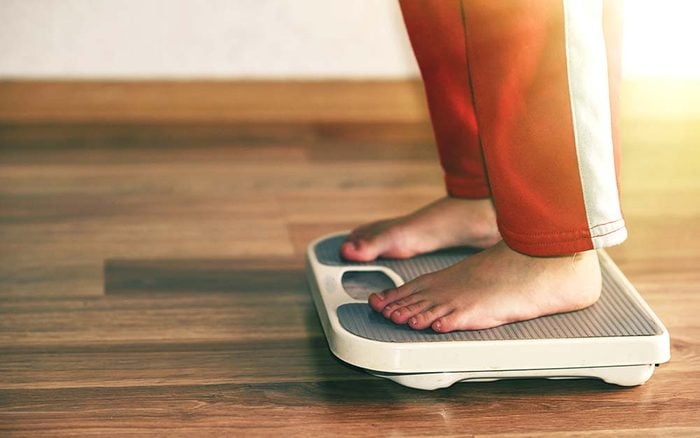How Many Calories Are in a Pound? What It Really Takes to Lose One Pound
Updated: Nov. 23, 2020

It's relatively easy to drop one pound of water weight, but shedding one pound of fat is another story altogether. Here's how many calories are in a pound and what it really takes to lose one pound in a week.
“Lose 10 pounds in just two weeks, guaranteed!” Sound familiar? So many diets promise miracle weight loss that sounds too good to be true, and generally it is. We talked to experts about how many calories in a pound you’d need to burn off in order to see results.
The short answer: It depends on what type of pound we are talking about. It’s easy to lose a pound of water or a digit on the scale. If it’s losing a pound of fat—and keeping it off—that’s more challenging.
How many calories are in a pound?
In simplest terms, losing fat—even just a pound—means taking in fewer calories and doing more physical activity. There’s been much ado about how many calories make (or break) a pound. The number of calories in a pound is far from set in stone. “There is an adage that a 3,500 caloric deficit is needed to lose one pound, and this is a good average, but height and weight matter too,” explains Holly Lofton, MD, director of the Medical Weight Management Program at NYU Langone in New York City. There is likely no single answer as to how many calories you’d have to skip to lose one pound, since the number of calories in a pound can vary greatly depending on the person, but we do have a ballpark. “You’d need a deficit of 2,000 to 4,000 calories depending on person’s build,” Dr. Lofton says.
For some context, a McDonald’s Quarter Pounder with cheese has 530 calories; add fries for another 230 and a sugary soda for 70 more.
But it’s not just how many calories in a pound—it’s what type of calories. Not all calories are equal by any stretch, and the amount of calories in a pound is also dependent on the food itself. “If you cut 3,500 calories and just ate ice cream, you would lose less than if you chose asparagus and chicken,” Dr. Lofton says. “You want to eat a protein and carb mix or a protein and vegetable mix,” she says. Her tip: High-fiber, low-calorie vegetables such as cabbage, broccoli, and spinach will allow you to feel fuller, making any caloric deficit easier to manage. Here’s how to find out how many calories you should be eating to lose weight.
Protein is also key here because it’s super thermogenic, adds Jason Ewoldt, RDN, LD, a wellness dietitian at the Mayo Clinic Health Living Program in Rochester, Minnesota. This is a science-y way of saying that protein turns up the heat in our body’s furnace, which increases our metabolism and our ability to burn fat.
By contrast, eating just carbs will increase fat storage by raising insulin levels. Here’s what happens: You mow down a bag of chips, your glucose or blood sugar shoots up, and your pancreas produces a large amount of the hormone insulin to take the excess glucose out of your bloodstream. The glucose converts to a starch called glycogen, which is stored in the liver and in muscles. The catch? Your body can only store a limited amount of glycogen, so the excess glucose is stored as body fat.
Our physical build also factors into our ability to lose even just one pound of fat. “If you think of muscle tissue vs. fat tissue, the muscle needs more calories to be maintained,” Ewoldt says, “so one individual could theoretically ingest more calories and still lose weight [compared with someone] who has more adipose fat tissue.”
How can you lose one pound in a week?
“In the short term, it takes an energy deficit—burning off more than you take in,” says Scott Kahan, MD, MPH, director of the National Center for Weight and Wellness in Washington, DC. But, Ewoldt cautions, “humans are very bad at keeping track of how much they’re eating. They generally underestimate calorie intake—they forget about that candy bar they ate in between lunch and dinner. They forget about pouring a little more orange juice in their glass in the morning—and that all adds up.”
In addition, people “tend to overestimate calorie expenditure. So we go for a walk and think we burn 500 calories, and you put that person in a research setting and it’s actually only 200,” he continues.
Exercise does make a difference though, Dr. Lofton says. She typically recommends a minimum of 180 minutes a week of huffing and puffing for weight loss, and sometimes suggests kicking it up to 300 minutes per week. Some exercises are superior calorie burners than others.
“For most people, focusing on moderately decreasing caloric intake will be more reasonable to achieve than increasing physical activity, though a combination is ideal,” Dr. Kahan says. “Most important, especially for those who have had challenges managing weight, is figuring out why it’s been difficult to decrease their calorie intake or increase activity.” Ready to get started? Check out these 42 quick and easy weight-loss tricks.

